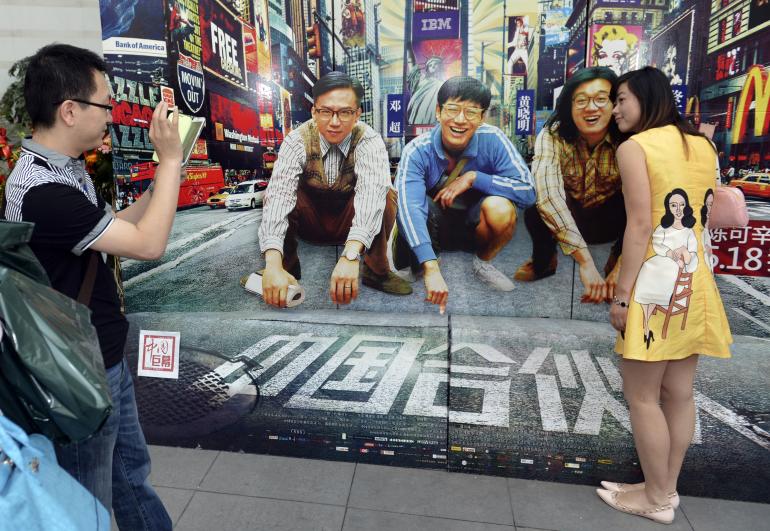China’s domestic film industry is booming and outpacing foreign films at the box office. While Hollywood blockbusters starring super hero hunks with high-tech gadgets and indestructible limbs like “Iron Man 3” and “Man of Steel” still raked in millions of dollars, domestic Chinese films, especially those depicting ordinary Chinese people instead of the once-favored willowy, sword-wielding heroes, are growing in popularity with the country’s expanding cinema-going public.
For years, Chinese filmmakers limited their subject matter to the grand, historical epics with martial arts heroes and their aesthetics to sweeping shots of landscapes, but that is beginning to shift.
“The past half year has seen the Chinese audience identify with and feel proud of their own lives,” Peter Chan, the director of “American Dreams in China,” a film about young Chinese in the late 1980s starting an English instruction school, said in a recent newspaper interview, according to Reuters. “They want to watch their own lives in the cinema, watch realistic themes.”
“American Dreams in China,” based on true stories from Yu Minhong, founder of New Oriental Education & Technology Grp (NYSE:EDU) and his partners, earned more than 100 million yuan ($16 million) in the first three days after release.
The film then went on to become the fifth-highest-grossing film in China this year, earning 537 million yuan in less than two months after its release in the mainland alone, bringing China’s total box office sales in the first half of the year to nearly 11 billion yuan ($1.8 billion), according to the government agency that tracks media.
“This is a big boost to the market and it set the tone for the year-round revenue to exceed 20 billion yuan,” said Kady Yang, senior analyst at entertainment consulting firm EntGroup, according to Reuters.
Cinemas in China brought in $2.8 billion in 2012, and they could bring in $3.3 billion this year, which would be a record high. While that number is still small compared to the North American revenue of $10.8 billion last year, the Chinese box office could grow as much as 15.6 percent annually for the next five years, and hit $5.5 billion by 2017, predicted PricewaterhouseCoopers, a consulting firm.
Wang Jianlin, officially the richest person in China, has perhaps benefitted more than others from the rise of China’s cinemas. Wang’s Dalian Wanda is now the world’s largest movie exhibitor in the world after purchasing American chain AMC Entertainment for $2.6 billion in 2012, according to the Hollywood Reporter. Wanda has more than 500 cinemas with 6,000 screens in China and has just ordered up to 120 new giant screen theaters.
Domestic films account for a big portion of that growth. In the first half of 2013, domestic films outperformed foreign ones by 65 percent in China, a new trend at the Chinese box office – in the first half of 2012, imported films earned twice as much as domestic productions.
While Hollywood blockbusters like “Iron Man 3” remain popular in China, the success of local content has become more prominent as cinemas expand into second- and third-tier cities where stories about ordinary people may be more relevant for moviegoers, Reuters reported.
“For viewers who grew up watching TV and videos from the Internet, they are more familiar with and more receptive to movies with local culture and human interest elements,” said Yin Hong, director of the Center for Film and Television Studies at Tsinghua University.
As the cinema-going sector grows in China, filmmakers can now diversify their topics to aim at target audiences instead of hoping to appeal to everyone with the epic martial art films of the previous decade.
“Tiny Times,” a film based on a book of the same name by best-selling author Guo Jingming, was criticized as a promotion of pop idol actors. The film’s audience had an average age of 20, and was more than 80 percent female, according to an analysis of data from Weibo, China’s equivalent of Twitter, but that very specific group still constitutes a large number of people in a country with a nearly 1.4 billion population. The film scored more than 400 million yuan at the box office.
“When the total market size is big enough, it is possible to develop some niche markets,” said Zhang Benhou from Beijing-based HuiCong Research, according to Reuters.
Foreign Talent Agency – Provides Foreign Models, Actors, Host, Dancers and A&R Talent in China.外国人才中介机构 – 提供外籍模特,演员,主持人,舞蹈家和A&R在中国的人才。时光网讯 由斯派克·李执导、乔什·布洛林主演的电影《老男孩》今日发布4张新剧照。这部翻拍自同名韩版的电影每次新发剧照都引人瞩目,斯派克·李的视觉风格逐渐展露无遗,此次曝光的剧照中,也可以看到伊丽莎白·奥尔森饰演的年轻女孩手举黄伞立于雨中的风格化酷烈场面。本片将于今年的10月25日北美公映。
美版《老男孩》改编自韩国同名电影,韩版由导演朴赞郁2003年完成,翌年在戛纳电影节获得评审团大奖(二等奖),影片也逐步成为具有国际影响力的作品。美国导演斯派克·李2011年确定执导美版《老男孩》,之后敲定了《老无所依》的男主角乔什·布洛林出演男一号。
韩版《老男孩》的男一号由崔岷植担纲,他具有爆发力的演技在片中发挥的淋漓尽致,乔什·布洛林能否做出突破,目前还需拭目以待。韩版中有一段走廊格斗长镜头被观众津津乐道,目前美版片方还宣传过这段重头戏,看来悬念是要留到影片上映前后了。
此次翻拍的改编剧本由《我是传奇》、《雷神》编剧马克·波特瑟维奇执笔,影片将讲述一个男子在被莫名绑架囚禁20年后,实施复仇的故事。《第九区》男星沙尔托·科普雷将出演本片中“老男孩”的复仇对象(韩版饰演者为刘智泰),此外参演的还有老牌黑人影星塞缪尔·杰克逊。
(编辑:小托)
Source: https://news.mtime.com/pix/2013/08/22/397962.html
Foreign Talent Agency – Provides Foreign Models, Actors, Host, Dancers and A&R Talent in China.外国人才中介机构 – 提供外籍模特,演员,主持人,舞蹈家和A&R在中国的人才。


